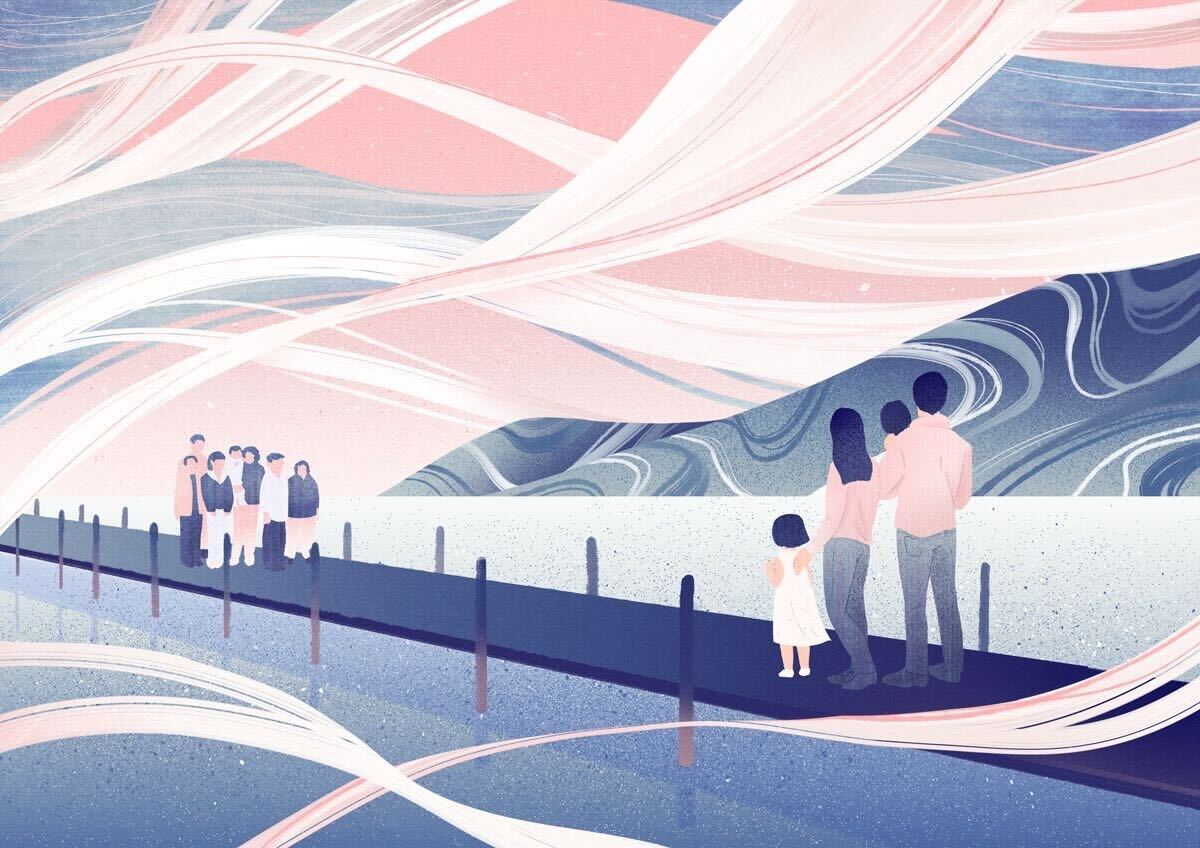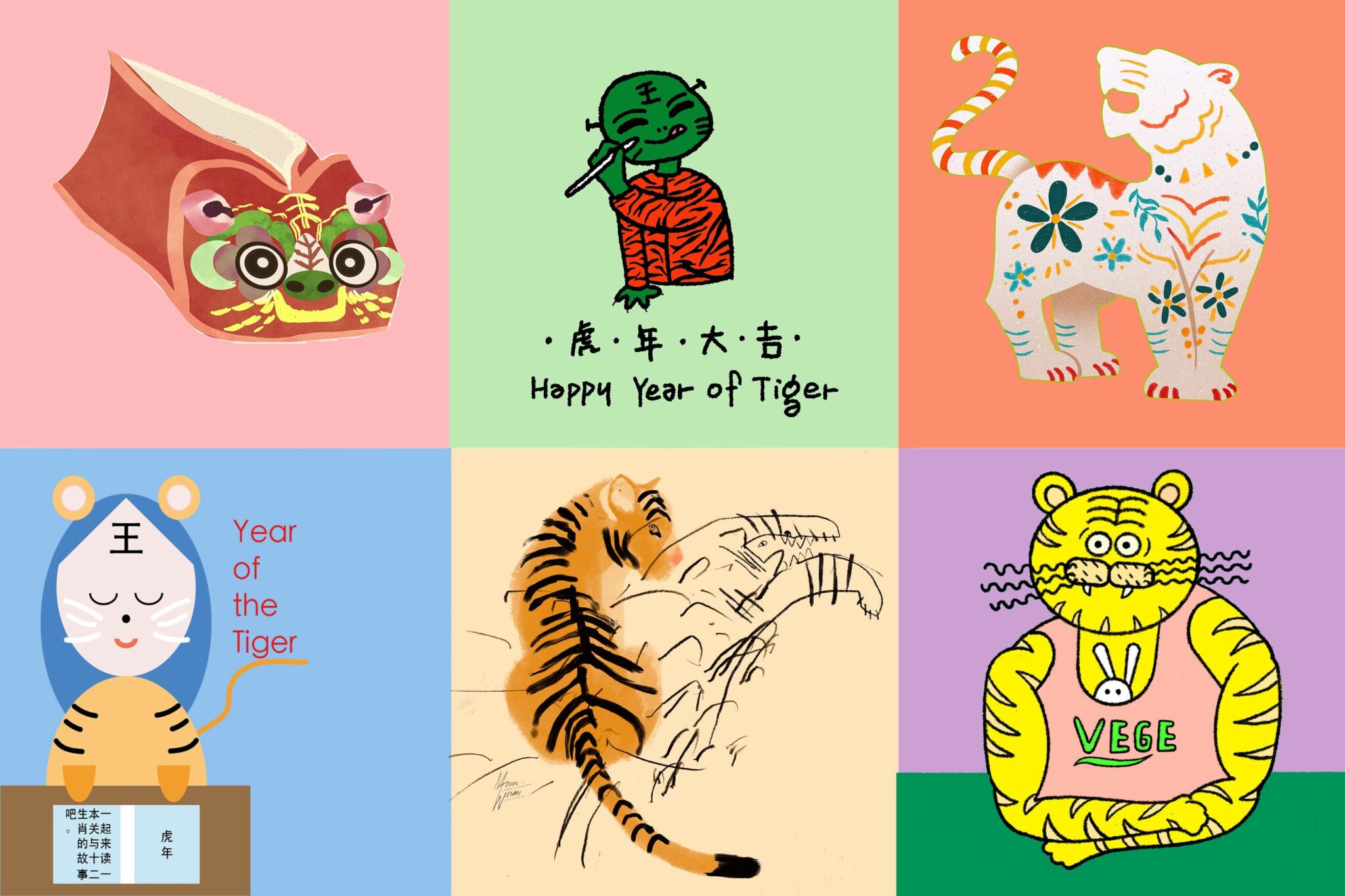ZhongDe, the Magazine That Connects the Chinese-German Diaspora
By Janice Faith Heinrich
Art: ZhongDe
ZhongDe is Mandarin for Chinese-German. It’s also the name of a new online magazine for the Chinese-German diaspora, founded by Li Cheng in the fall of 2021. The magazine provides a platform for connection, education, and expression for the Chinese-German diaspora by way of collecting and sharing different stories, experiences, and biographies. We talked to team members Li, Bella, Maike, Zhu, and Susanna about Chinese-German representation, launching ZhongDe during the pandemic, and family traditions.
ZhongDe is quite a new project, with its first issue being launched in the fall of last year. When and how did the idea of founding a magazine come up? What was it like to launch a magazine in the middle of a pandemic?
Li: While I have always wished for greater visibility and representation of the Chinese-German diaspora, the idea for the magazine didn't come about until the summer of 2021. After some friends encouraged me to move forward with the idea, I created an Instagram post asking for people to join the team. The response was overwhelming. More than a dozen wonderful people reached out. From there, everything developed naturally and we began to find means of communication and organisation over Zoom.
I think launching the magazine in the middle of the pandemic was both good and bad. It made it so much easier to find people from all over Germany. So many activities and parts of our lives had already shifted to the digital sphere. Our communication wouldn't have felt so natural and easy if we hadn't all already gotten used to Zoom. But of course, it's a very different experience to meet in real life. A few people from our team have already met in Berlin and Cologne. But given that we're spread all over Germany, we will continue to meet online for now.
Susanna: I think one of the great advantages of launching a magazine during the pandemic is flexibility. Because we meet online, we aren't restricted to voices from a certain part of Germany. We are scattered across the country and that makes the project so precious.
What does ZhongDe stand for and who did you create it for?
Zhu: ZhongDe offers a Brave Space for the Chinese-German community. A space to learn, evolve, and grow together. We realised that the Chinese-German community is not well connected, despite its size. Yet there is a need for connecting. More and more BIPOC have self-organised over recent years. Be it in the form of political actions or by celebrating their culture and heritage. Given this, as well as the all too common racist framing of China and Chinese people during the Covid-19 pandemic, we needed a common space for exchange where we could present our own narratives. You don’t have to be Chinese-German to read our articles though. ZhongDe is for everyone. It might be even more relevant to people outside the Chinese-German community, as press, film, and any other media is reproducing one-dimensional images about China. It is our intention to show the diversity of Chinese-Germans, and to challenge the single-story narrative.
Do you think there is any good Chinese-German representation in German media? What do you think needs to change?
Maike: There have been representatives of Chinese ancestry in Germany for a long time. But so far, we've perceived them more as individuals or modest bystanders than as representatives of a proud German-Chinese community. Diasporic is a great term to describe a barely connected Chinese-German community. My family and I have never been part of close-knit communities. Experiencing our group and having a space where you can connect with people who have a similar background is a first for me.
Li: I find it hard to answer whether there is “good” representation of Chinese-Germans in German media since there is barely any representation at all. The most Chinese representation in Western contexts that I see comes from North America. Representation gets better with quantity. I want to see more BIPOCs in all forms of German media, in leadership positions, on TV, on posters. And not just for the sake of fulfilling a diversity quota. When more of our voices get seen and amplified, we are challenging normative beliefs about what marginalised groups can and cannot do.
ZhongDe’s first issue was about family. What does family mean to you? Why do you think chosen families are so important for BIPOCs and queer individuals?
Li: Family, to me, is a group of people I love and trust unconditionally. That extends beyond biological family – friends can become family, too. First-generation immigrant parents often carry their own struggles and traumas into their parenting. Struggles that are unique to their experiences crossing cultural, geographical, and social contexts. These can complicate parent-child relationships. I am lucky enough to have strong bonds with my biological family but I realise that this does not apply to everyone. We need to be aware that especially for marginalised groups such as BIPOCs and queer individuals, it is crucial to have a group of loving people to rely on.
Zhu: Chosen family is important because immigrant parents can be passive and prefer to remain silent when they or their children experience racism. They have learned that not standing up to oppression and discriminatory structures ensures a wage and keeps them out of trouble. But many young BIPOCs now feel more anger, more momentum, more motivation to change oppressive structures. And, of course, we can't do it alone. We need people around us to support, love and fight with us.
Maike: Family are the people we're drawn to identify with. They are somehow extended parts of ourselves, though some members of our families seem to be dysmorphic and alienated from us. That‘s where the chosen family comes into play. It's important that we find a form of safe space where we can experience our true selves without fear of resentment. The idea, or ideal, of family is supposed to give you a sense of belonging.
Bella: For everyone in the German-Chinese community, family means something different. We can use this platform to provide a spectrum of diverse voices. I don't just want to focus on Western views, but also on the voices of those who grew up in the East. How do they define family and how do they see themselves in it?

You just released your second issue which approaches the complex issue of identity. Why do you believe it’s important that we write about identity?
Maike: Identity is a construct of us as a person. BIPOCs often experience a narrative that links identity with origin. Through the experience of othering and stereotypes, we often find ourselves questioned. But we also question ourselves a lot. Who are we, what kind of person are we supposed to be and who do we want to be?
Zhu: People tend to have less empathy with BIPOCs because of the constant framing and storytelling about them. It’s important that BIPOCs finally get a chance to write about themselves as they see themselves. We have feelings, desires, dreams, hope and histories that need to be told – by us, not the oppressors!
Bella: Identity is a complex issue. In the diaspora community, "we" often refer to ourselves as BIPOCs, minorities, second-generation and other related labels. I, personally, cannot relate to these identities which have to do with my upbringing in China. It’s important to also talk about identity from the perspective of those who didn’t grow up in Germany. It gives us the opportunity to see how identity shapes the way we are and think when we live in Germany.
Li: Everyone has multiple identities. I am Chinese-German, I'm also a woman, a daughter, a sister, a friend. I'm a student, sometimes a teacher, an environmentalist, and shamefully, a frequent flyer. I have many identities, and so does everyone I know. Too often we are reduced to one of those identities. Writing about identity helps me understand and explore the many versions and aspects of myself. Hopefully does the same for others.
How do you decide on the topics for your different issues? Which topics would you like to explore in the coming ones?
Maike: We have created a list of topics that interest us which helps us with editorial planning. When we plan the next issue, all ZhongDe members can vote on the topics they like the most.
Bella: I’d say as for topics, I would like us to try to explore as much as we can. This platform is a chance for everyone to write and create something they’re passionate about, something that’s important to them.
Li: Spoiler alert: our next issue deals with the important topic of community and racism. We have a very long list of topics that we are yet to think, talk, and write about, which will hopefully result in many more ZhongDe issues.
What would you like ZhongDe to develop into in the future? Do you see yourself exploring different mediums like print?
Maike: It would be nice to develop and connect with other platforms so we can collect different voices and publish along with a diverse community. We also want to find different ways to communicate with readers so that people who feel similar can find us and feel seen.
Li: We're indeed thinking about a print version in the future, perhaps in time for our third issue. I hope that in the coming years we will be able to obtain funding and invest in more elaborate projects. At the moment we're all working on a voluntary basis. We are also looking into collaborating with various organisations and projects.

What are your favourite print and online magazines?
Zhu: Of course DADDY Magazine!
Maike: A close friend gave me a subscription of “Missy Magazine” for my birthday, so I'm reading it regularly. I also like the concept of “DUMMY” and enjoyed the idea of ”Das Buch als Magazine“ a lot. Reading “Literarische Diverse“ and the Austrian “Perilla“ magazine is on my bucket list.
Bella: I'm more interested in magazines that aren't necessarily German. I would recommend “Tema” or “ChinaNauts” and since I speak Chinese almost fluently, I use that to my advantage to explore Chinese magazines.
Li: I would highly recommend “Qamar Magazine”, a Muslim magazine for culture and society, as well as “renk.”, which highlights perspectives from and for People of Colour. And of course a huge shoutout to DADDY Magazine! Thank you so much for having us.
This interview has been edited and condensed. You can find ZhongDe Magazine online or follow them on Instagram. Art by: Christina Zhu, Bella Wagner, Maike Siu-Wuan Storf, Feng Yitong, Jiayu Ni, Tao Sui.
Get DADDY in your Inbox
Stay in the loop by subscribing to our newsletter